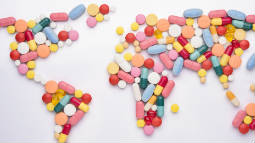With all that goes into trip planning and packing, sometimes simply remembering to bring your medicine overseas is a victory.
But simply remembering is just the start of ensuring you’re able to carry and take prescription medication on far-flung business trips and family getaways.
There are a number of questions you should ask and answer — as well as some precautions to take. This guide will help ensure you’re able to follow your prescription medicine regimen as closely as possible when travelling overseas. So unlike that fine print on the little bottle or bag you don’t always read all the way through, be sure to give these instructions a thorough review.
Before you bring medicine overseas
Planning is critical for successfully flying with medicine overseas. Here are some of the questions you’ll want to ask and answer when you’re still a few days out from your trip:
• Are your prescriptions legal in your destination country or countries?
Before you go through all the trouble of packing your meds, you need to figure out if they’re allowed in all the stops on your itinerary. When we start talking about medicine you might want to be concerned about bringing abroad, we’re primarily talking about narcotics, etc. — primarily prescription pain killers. The International Narcotics Control Board (INCB) broadly states that international travelers should be allowed to carry needed prescription drugs for up to one month, and that they should have a physician’s note or prescription, specifically for narcotic drugs. That said, you should take the opportunity to review countries’ specific policies pertaining to these controlled substances on the INCB site. Finally, be sure to bring any such medications in your carry-on baggage, and if you’ll require syringes, please bring a clean supply. (Note: We’ll talk more about proper packing procedures in the TSA section below).1
There may be other drugs that are simply unavailable in certain countries. It’s always a good idea to research how your specific medications comply with a country’s laws before scheduling your itinerary.
• Are you current on your prescription medications? As in, do you have enough of a supply to cover all the days you’ll be travelling — plus a little extra in case you’re delayed? And if you don’t, do you have refills remaining on your prescription or do you need to sneak in a visit to your physician before leaving on your trip?
• What about medication you take sometimes? It’s easy to remember and account for medication that you take daily. But what about those prescriptions you only need in certain circumstances. Err on the side of caution and ensure you have these available, too.
TSA rules for traveling with medication overseas
Whether you’re taking prescription drugs on a commuter jet from New York to Boston or you’re taking medication overseas for a jet-setting adventure, you’re going to need to comply with Transportation Security Administration (TSA) guidelines.
All drugs, prescription and over-the-counter drugs, are subject to security screening. But let’s focus on travelers’ responsibilities when flying with those that are prescribed by a physician.
The rules here aren’t as stringent as you might imagine. For starters, medications don’t need to follow standard TSA policies for liquids. You can bring medicine in “reasonable quantities” – more than the 3.4-oz. standard other liquids need to meet – and they don’t need to be placed within a zip-top bag. Medications that comes in pill and solid form can come in unlimited amounts.
While these rules are fairly accommodating, know that all medications are subject to additional screening. While you can take all prescription medication in either your carry-on or checked baggage, if you do carry it through a TSA check point, please inform an agent before being screened.
Finally, while you don’t need to carry prescription medication in its original container, it’s always a good idea, as is keeping the actual prescription or a physician’s note.2
Remember, these are TSA rules governing domestic travel. Be sure to consult with the specific laws and regulations for all the nations you’ll be traveling to and through as you plan your trip.
How can travel insurance help with getting medicine overseas?
The scenarios we’ve outlined all assume that you’re bringing medication with you abroad. But what happens if you forget, run out, or sustain a covered injury or illness that requires a new prescription drug?
These are scenarios during which travel insurance providers, such as Allianz Global Assistance, can help out in more ways than one. Let’s tackle the first two questions, when you simply don’t have the medicine you need on hand. You can try contacting the prescribing physician back home, but you may run into trouble. First of all, this doctor may not be able to prescribe drugs in the nation you’re visiting. And second, the drug you normally take may not be available, meaning you’ll need to learn the alternative name for the drug or chase down a safe substitute for this medication.3
Here are just a few drugs popular in the United States that aren’t available in the specified nations: Avandia for diabetes treatment (United Kingdom, India, New Zealand and South Africa), Phentermine for diet (United Kingdom) and Soma, a muscle relaxant (Norway and Sweden).4
U.S. Embassy or Consulate personnel might be able to aid you in the event of not being able to get a medication you have access to at home, but this is what travel insurance companies are there for. For example, Allianz Global Assistance can help you find the right medication and where to get it. If it’s a new drug, the same services can be provided, in addition to other needed travel insurance benefits that may accompany a covered illness or injury, such as a medical evacuation, trip interruption, as well as the medical insurance that goes toward the costs of treatment and medication.3
Remember that travel insurance and assistance companies such as Allianz Global Assistance will often offer a concierge benefit, a trusted resource you can connect with 24/7 to help troubleshoot these types of medical issues when you’re planning a getaway or during the actual getaway.
Between automatic prescriptions refills at our neighborhood drugstore and opening the pill holder for that specific day, at home we’re often on cruise control when it comes to getting and taking the prescription medications that keep us happy and healthy. But when you’re traveling overseas or anywhere, it’s important to take a minute, step out of that comfort zone and plan ahead.
Related Articles









Share this Page